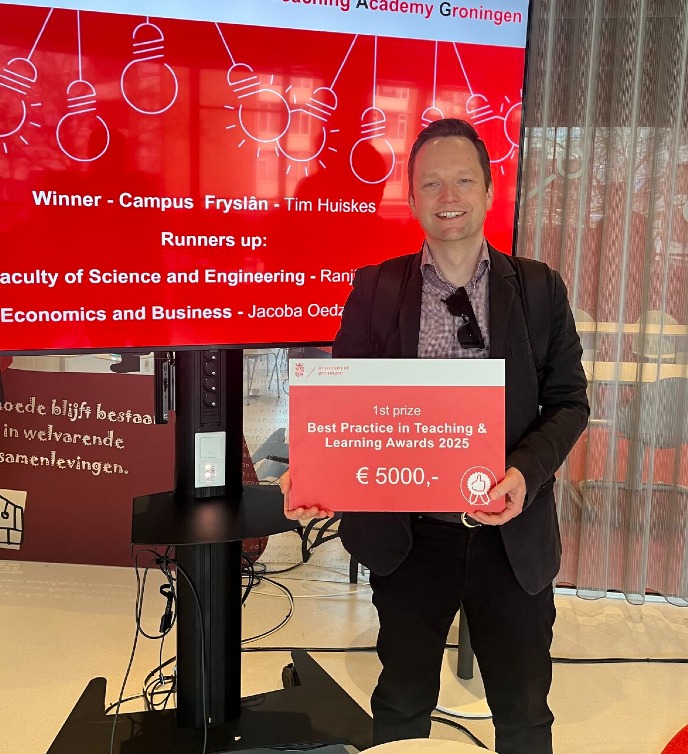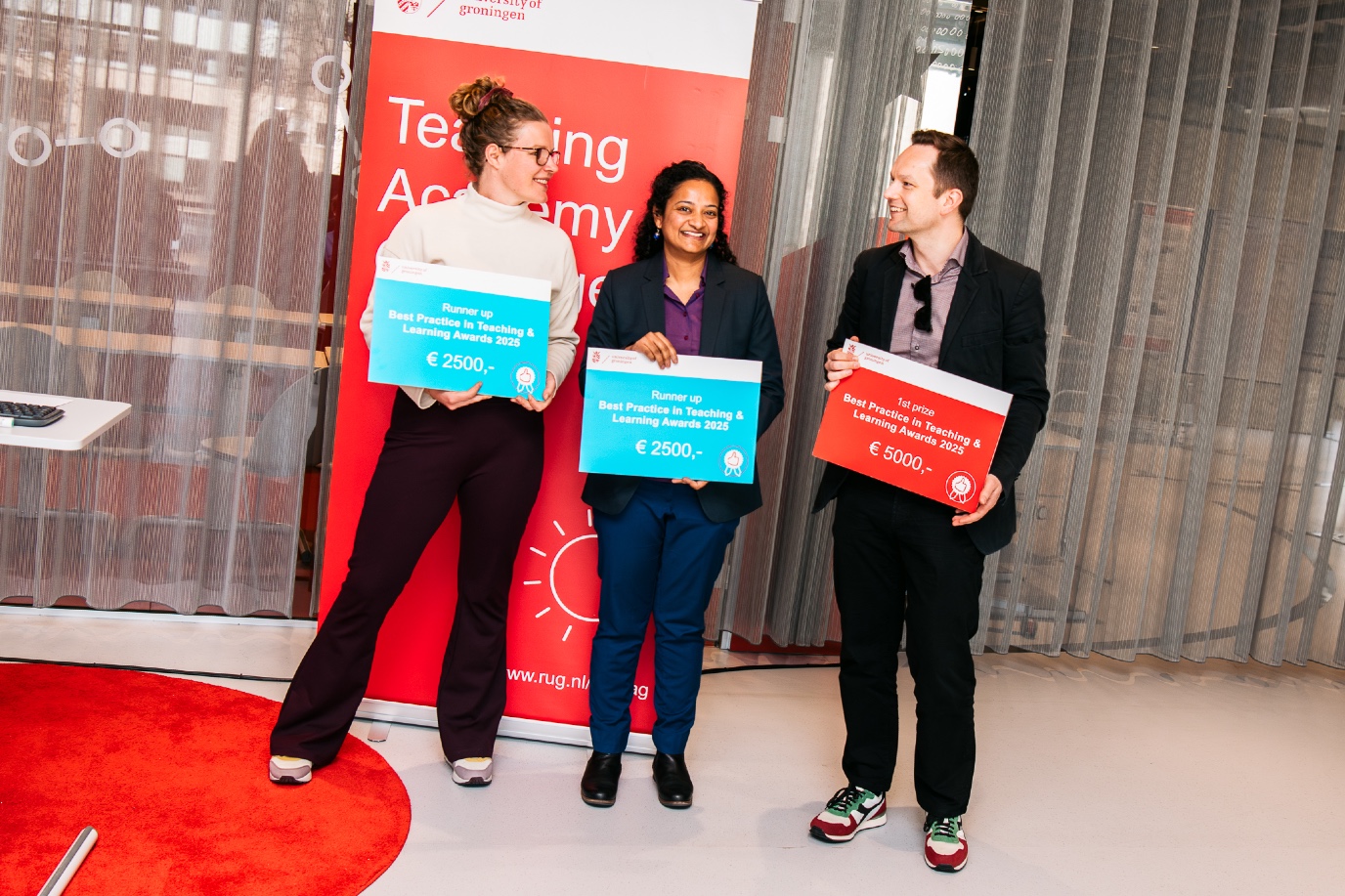Tim Huiskes: 'Embrace internationalization, even when it goes against the tide'

Connecting students on both sides of the Atlantic for intensive virtual discussions, collaboration, research, and presentations. That is the basic principle of the Best Practice in Teaching and Learning 2025 developed by lecturer Tim Huiskes for the Transatlantic Virtual Exchange project, part of the Global Responsibility and Leadership Bachelor’s degree programme. Given the extraordinary times we are living in, we need to build and maintain international relationships.
Are you surprised by the win?
Definitely, considering that my colleagues are just as dedicated to teaching innovation as I am, but on the other hand, it wasn’t entirely unexpected either. International exchanges are very demanding for both lecturers and students. This winning project from Leeuwarden is no exception. You would have to be very convinced that it is worth the investment, even more so than all the other hugely relevant and inspiring improvements. Game-based learning lost by a narrow margin this time, but in its many forms, it is bound to secure a place in the University’s new educational strategy. Congrats! Now that’s a real win.
Will all the imposed cutbacks and restrictions still leave room for internationalization, especially when it involves institutions from countries with which we sometimes have issues? Try finding an American lecturer who dares to engage in European collaboration under the current circumstances. Or try finding critical students willing to work with young Democrats and Republicans alike. To embrace the opportunity to maintain such demanding foreign ties at a University that is already under considerable financial pressure. We have achieved something remarkable at Campus Fryslân, with our equally remarkable connections, and the jury has rightly acknowledged this.
What does the Transatlantic Virtual Exchange Project of the Governance and EU Law course unit entail?
Governance and EU Law is a popular second-year course unit in our broad-based Bachelor of Science (BSc) in Global Responsibility and Leadership (GRL). According to the Dutch Higher Education Guide, it has been a top-ranked degree programme for six years running, and for the last four years it has even been rated the best degree programme in the Netherlands. Together, we have built this up from scratch in Friesland.
In simple terms, this course unit teaches our idealistic young people to achieve their political goals with realistic policy proposals. To achieve this, we study the European policymaking and legislative process in a global context. The Transatlantic Virtual Exchange project allows us to highlight, from a unique perspective, the important role that the United States plays in this process.
In this exchange project, students on both sides of the Atlantic work together online on policies that are compatible with the legal systems on both sides and that can count on sufficient public support. The aim is to learn from each other about similar challenges and to tackle common problems.
Virtual international exchange is a proven learning method. It uses technology for moderated, long-term, structured remote interaction to improve digital skills, language and communication skills, media literacy, and intercultural understanding. That is much more intensive than most superficial exchanges via social media, distance learning, or occasional encounters. During the semester, students need to actually learn to research, present, discuss, decide, and write together, and they do that fantastically well!
How did you develop your best practice?
Various public and private institutions in America, Europe, and elsewhere support virtual exchange. In our case, this was the Ministry of Health, Welfare and Sport (VWS). They facilitated the search for a foreign partner, training, embedding the programme in our curriculum, and setting up the learning environment.
On a personal level, I am primarily motivated to teach my students about international relations by giving them first-hand experience. In addition to our working visits to political institutions and simulations of legislative negotiations, these diplomatic exercises fit in very well with this approach. What’s more, we really need them.

What has the students’ response been so far?
They approach it with great enthusiasm. Many of them quickly encounter substantive or practical challenges. For example, it can be challenging to work effectively with someone who sometimes has fundamentally different values, while only communicating via a screen and from a different time zone. Thanks to the programme, they are now better prepared to deal with these challenges, which professionals also encounter.
The virtual nature of the assignments also offers added value for those who, for various reasons, are unable or unwilling to travel, enabling them to gain valuable international experience, inspiration, and contacts. For a few, this has led to a face-to face meeting at a conference in Belgium, and who knows, perhaps new transatlantic friendships for life.
What did you learn from the project?
A great deal. We are now entering the third year, and I am still learning all the time—not least from the innovative solutions that students themselves come up with. If I had to highlight two learnings, I would say that, due to my own enthusiasm, I initially underestimated the time and effort it takes to really get international collaboration off the ground.
I consider myself lucky to have a foreign professor who is at least as enthusiastic, flexible, knowledgeable, and reliable as I am, as well as generally motivated students and the indispensable support of wonderful faculty colleagues. Imagine trying to do any of that on your own. Just the coordination of curricula and timetables alone is a lot, and I will not take that lightly ever again.
In addition, I have come to realize how much students need lecturers who not only facilitate their learning process, but also help them find direction and meaning. That is why we increasingly discuss their experiences in light of academic theory and professional practice. Where do the value systems and political cultures in today’s America and Europe diverge? How do delegations on both sides deal with this? The past year has provided a wealth of material to work with in this regard. Last but not least, it is important to consider what career prospects this experience can offer.
What advice would you give other lecturers in the field of teaching innovation?
Continue to embrace internationalization, even when it goes against the tide. Build lasting relationships and make an effort to maintain them. Keep an open mind to innovation, but hold on to what is valuable.
More news
-
07 July 2025
The darker side of tourism
